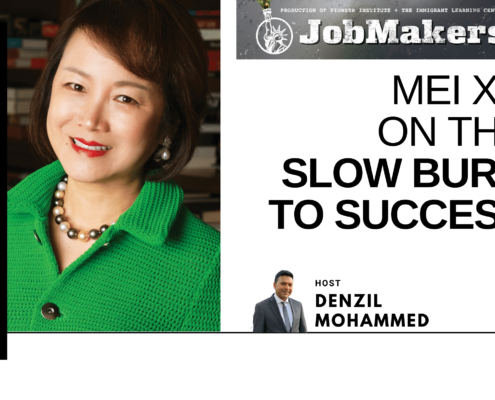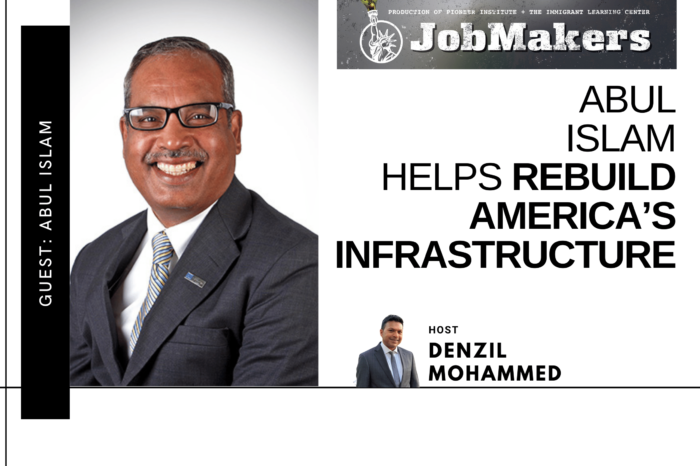Abul Islam Helps Rebuild America’s Infrastructure
/in Economic Opportunity, Featured, JobMakers /by Editorial StaffThis week on JobMakers, host Denzil Mohammed talks with Abul Islam, immigrant from Pakistan and founder, President and CEO of AI Engineers. America needs solid infrastructure to grow the economy, to ensure we can get to work, ship supplies, and travel freely. But who’s doing the rebuilding? AI Engineers is a Connecticut-based consulting firm that builds and rehabilitates bridges, transportation systems and building systems throughout the U.S. Since 1991, Abul has created nearly 1,000 jobs and today leads a $50 million company. He talks about the power of Science, Technology, Engineering and Math (STEM) education to uplift urban centers. While we draw talent from international students and H-1B workers, he believes the U.S. must create a homegrown pipeline of skilled workers, as you’ll learn in this week’s JobMakers.
Guest
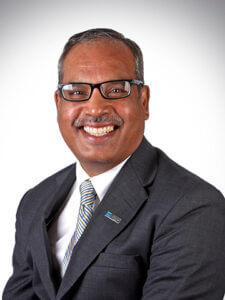 Abul Islam is the Founder and President/CEO of AI Engineers. In addition to overseeing AIE’s day-to-day operations, Abul serves as Senior Project Executive for many of AIE’s projects to ensure on-time, on-budget, and high quality project delivery. His specialties include leading project teams, providing technical guidance, and managing financial project goals. Outside of the office, Abul is very active within the business and education communities, and serves on several Boards of Directors and as an influential advisory member of business and education organizations.
Abul Islam is the Founder and President/CEO of AI Engineers. In addition to overseeing AIE’s day-to-day operations, Abul serves as Senior Project Executive for many of AIE’s projects to ensure on-time, on-budget, and high quality project delivery. His specialties include leading project teams, providing technical guidance, and managing financial project goals. Outside of the office, Abul is very active within the business and education communities, and serves on several Boards of Directors and as an influential advisory member of business and education organizations.
Get new episodes of JobMakers in your inbox!
Read a Transcript of This Episode
Please excuse typos.
Denzil Mohammed:
I’m Denzil Mohammed and welcome to Jobmakers.
Denzil Mohammed:
So we finally have an infrastructure bill signed into law. Last November. America’s infrastructure is not in good shape and we need solid infrastructure to grow the economy. How else do we get to work? Shipping supplies and travel from here to there, but who’s doing the rebuilding? For Abul Islam, immigrant from Pakistan and founder, President & CEO of AI engineers headquartered in Middletown, Connecticut, he’s one of people helping to rebuild America. AI engineers is a consulting firm that builds and rehabilitates bridges, transportation systems, and building systems throughout the us. Since 1991, a has created nearly 1000 jobs and today leads a $50 million company. Abul believes in power of education, particularly in science, technology, engineering, and math or stem to uplift urban centers and create a pipeline of skilled workers. Because while we draw that talent from international students and H1B workers, it’s something the US is sorely lacking in its own students and future workforce, as you’ll learn in this week’s JobMakers. Abul Islam, founder, president, CEO of AI Engineers in Middletown, Connecticut. Welcome to the Jobmakers podcast. How are you?
Abul Islam:
Thank you, Denzil. How are you doing?
Denzil Mohammed:
I’m pretty good. So give us the 30-second pitch about your company, AI Engineers. What do you do?
Abul Islam:
We do consulting engineering uconstruction management for usually government agencies, state municipalities. We’ve also worked for federal government 90% of our business is with the state DOTs, government agencies you know, clients that own transportation networks and the business has grown from two people, me and my wife in 30 years to 261 people, six offices, Middletown, Connecticut as our headquarters. We have grown significantly in the last five years. We started as a minority disadvantage business. That was a great help. And now we are looking forward to growing this business actually doubling our revenue in the next three years.
Denzil Mohammed:
So why, why do you consider this line of work important and briefly, how has it evolved over the years? Cuz you’ve been around what, 30 years now?
Abul Islam:
Yes. This line of work is important for our country, our society, our community, because if you don’t rebuild your infrastructure, which is about at least 50, 60 years old bridgeshighways, public buildings, you know waters ways, wastewater, sewer systems if you don’t rebuild them, you will not have growth and economic development. And we in the US were the pioneers of building the first world-class highway, connecting 3000 miles east-west, 2000 miles north, south, the criss-crossing highways. But then somehow after the eighties, we did not expand anymore. Unlike China, you know, and other emerging countries who has really invested a lot more since the mid eighties or early nineties. And they have more modern infrastructure from high-speed trains to interchanges, highways connecting big cities,transportation, intermodal network and so on and so forth. So our business is absolutely critical in rehabilitating, upgrading and repairing our bridges and highways. So it’s all the more important for us to really rebuild our infrastructure. Now that we have finally got some money in the infrastructure bill to rebuild our infrastructure so that we can sustain our economic and social development. And that’s how critical infrastructure is and our line of business.
Denzil Mohammed:
Thank you for articulating that it’s so key to economic growth and that there was a time when we weren’t growing as fast as other countries. So you were born in Pakistan and a lot of Americans don’t have any idea what life is like in other countries. Can you sort of just take us back to your childhood in Pakistan and paint us a picture? What was it like growing up?
Abul Islam:
It was good generally, you know, back then when I was growing up in the late sixties, seventies and eighties, I came to the United States in January 1983 and life wasn’t that bad. I enjoyed my time in Pakistan when we were growing up, going to the engineering school, I was to hang out at the US Information Center, for that matter German or French, in Karachi, cultural centers and all that, and learned a lot about other countries and cultures by being in Pakistan before I even decided to come here for my graduates studies in engineering. So
Denzil Mohammed:
Education was something that was really important in your family, right?
Abul Islam:
Yeah, absolutely. As I said that you know, my grandfather got an English education that was almost like 110 years ago. And then he got a government job with then Indian government, which was the capital in, in, in which is Calcutta back then. And successively, all of the family members went to schools, you know, 12 year schools, colleges in Karachi, New Delhi, wherever our family spread all over the subcontinent and they made it a point to send their kids to school. Even if they have economic difficulties or challenges, middle class people, you know, two parents working for a government making ends meet, but they’re paying the tuition fee for sending their kids to English school or the local schools taking a lot of attention on what they study. We were seven brothers and sisters. I was the second one.
Denzil Mohammed:
You arrived in the US in January of 1983.
Abul Islam:
That’s right
Denzil Mohammed:
In New York City. What was the experience like when you first moved here?
Abul Islam:
I was excited, although I didn’t have a lot of money. I didn’t know how I would meet my expenses for the next one and a half years. I didn’t have the tuition paid. I got an interest-free loan and some grants to pay for my tuition, you know, for first, second and third semester, but I just had an allowance of $200 a month for living expenses. You couldn’t just live in New York City for $200. All that was in 1983, the minimum was like $700 back then for a student, but I had $200. That was my, so I had to do work in the campus, outside the campus and full time student, you know but I didn’t complain, you know, I, I worked, whatever opportunities came along my way. I worked and without a lot of money, I, I had a good time.
Abul Islam:
I, I tried to immerse myself in the, in the cultural milieu of New York city, which I loved, you know, so many people from so many countries so many intellectual discussion music, you will used to get $2 music tickets at the Julliard school or others, you know, where you can you know, be there fraction of a price in a, in a concert or something, you know so all these things were not there in Pakistan. You know, the, the cultural part, you know, the art part other than engineering, which also expand my vistas and, horizon with regard to life, society, and community. So I can make a distinction between where I am from and how this society is different.
Denzil Mohammed:
I love how you are already such a curious person and to, to be AB to absorb all that New York city had to offer. And, you know, you’re an engineer, but you’re absorbing music and art and, and history and politics re really, really fascinating. But you did not intend to be an entrepreneur. You didn’t come here with the intention of starting a business. What brought you into this space of entrepreneurship?
Abul Islam:
Need, you know basically, the engineering salary was hardly enough to sustain a family. I just got married in ’89. I had my first born in ’90. I had signed up for a mortgage in March, 1990. People were advising, Hey, there’s a minority business program. And my big company that I used to work for, I was a licensed agent. Hey, you can start a company. I said, that’s a good idea. So I thought this over, it sat on it, on it for months and six months and eight months. Then after a year, I took the leap of faith and started my own company. And it didn’t go anywhere in the first 18 months, you know, almost ran out of my last saving on the 18th month before I got my first contract for $50,000.
Abul Islam:
That’s when it took off. And from the first $50,000 fee job we are a $50 million company today. And I, I work like I work like a dog, you know, doing night work, doing day work and myself, the production guy one day, you know, my wife doing the accounting and billing and all that stuff. Meeting calls to clients, you know, small enterprise and all that. So it took a long time. And that was a great time to really understand what business is. Accountants came along the way, lawyers, and you gotta know what you went to a couple of business training schools, three day classes, two day, what, everything, I took a lot of those classes and, and that opened my business with regard to the world of business. Cause nobody in the family had anything to do with business. So science engineering, or maths or doctors, engineer, lawyer, those were the three professions in fact. So nothing else, no, no concept of a businessman.
Denzil Mohammed:
I mean, that’s what I was about to say. There’s so many programs available now for budding entrepreneurs, you know, mentorship programs incubators, all sorts of things. And 30 years ago, we didn’t have those things. So it it’s quite remarkable that you were able to bootstrap and without having a safety net, very importantly, you’ve imbued your company with particular values. And I know that you are well aware of how aware young people are today of corporate responsibility. Can you talk about that and why those values are important?
Abul Islam:
They want to have the companies to have values society, you know you know, transparency in internal dealings too. That is very crucial for new building an agile organization, especially in our age where DEI is also so important. You know, it was not 20 years. I mean, DEI is, should be real. DEI was always there for these big corporations to wall street. They had, you know, somebody from our background, ethnicity color or whatever, put in a nice place, but he, he or she didn’t have the real power, what the industry is asking for now that if you have anybody, any ethnic class, you know, gender protected and all that, if you, he, or she’s got the power, it better be real power in the organization just don’t put your face and then say we are in compliance, but all minority requirements, that was the product I saw, but not, not, not anymore many companies, including private wall street companies are serious about giving opportunities to the qualified person across the board, across the D B D E I spectrum diversity equity and inclusion. You know, so this is real, this good. This is happening in my lifetime. After 30 years in business, it was not there.
Denzil Mohammed:
And I, I, I do recognize that, that you’re very intentionally are coming up with a new mission narrative for your organization. And this I imagine is a huge part of that.
Abul Islam:
Absolutely. So I have it a book you know, you can have it in our website too is called AI engineer. You know, if you can see it’s called our agile journey and in the, in the second page of the book, it says, and this is based on my own experience, working with government agencies that most organizations are rigid machines, triangle, or hierarchical silos, and all that. What we want to be is an agile organization where the we people-centric culture, you know, agile is people-centric rapid decision making collaborative team-oriented environment. And we are rather a nucleus here and all the, all the teams are working. This concept took me. The, this book is three years old and every employee has this book now. And we, we question them, you know, this is, we ask them, well, are we in, in compliance with this book?
Abul Islam:
We must practice agility because we live in a very uncertain and unpredictable world. When you can predict what is gonna happen tomorrow, you can have a process manual proceed, which is all good. So much of our world was, you know, last 50 years of industrial economic, huge development that we made everywhere, government private and all that was unpredictable that we can predict this. We can predict the outcomes. Therefore, a structured organization lends itself to make sense when our world is changing and become more unpredictable, more destructive, all of the factors, including new technology. You simply can’t use that rigid structure, especially in an organization where people work with their intellect engineering, talent experience and all that. So the agile practice is a logical for the, the successful firm engineering firm of the future.
Denzil Mohammed:
I love that you’re holding yourself accountable.
Abul Islam:
Yes,
Denzil Mohammed:
Absolutely. I wanna get into one particular area that’s really of interest to me and I’m sure to you two, so I’ve counted at least 23 job openings on your company’s web site. We know that there’s a shortage of American students in stem and for international students, foreign students who come to the us tend to dominate the stem, the stem areas. So we often have to rely on that foreign talent. And of course, you know, that foreign talent brings diversity, which in and of itself has its own richness. But what have you been doing or seeing when it comes to addressing this issue of education broadly, but also students in stem
Abul Islam:
It’s a need for businesses, just not our business it’s across the board, any sizes that there is a huge crisis of skilled force workforce. When we found what was useful was the H1B process. So historically, you know, we had used the H one D process very successfully going to the campuses with the master’s program, or even a bachelor’s program. They get a year or two for working legally after from their graduate school, you know you know, have an engineering four year or, or five, six year degree in masters. And then they can work for us for another three to six, sometimes nine years on the H one B that’s a great mood for companies like us because, you know we, we have a hard time attracting and recruiting the best and the brightest, you know, we definitely need these foreign talent, you know, to come to the United States immigrant, especially with the, the four year you know, engineering or technical degree program.
Abul Islam:
And they become eligible to work for us for three to three years with a certain minimum cap of salary that the federal actually, we pay more than that. You know, right now the market is whatever the, even the minimum salary of an entry level entry. Now two years experience say the us government says, say, pay 58. We pay at least 10, 15% over that just because of the market dynamics. Otherwise we’ll not have the talent that is such a good program, you know, because not too many people in the, in the 1980s, since the eighties have gone to engineering school, eighties, nineties you know, they have gone to finance the schools and this and that. So we don’t have the number of engineers four year degree engineers on many disciplines like we had in the 1980s or seventies, we were self efficient, no longer self sufficient.
Abul Islam:
So we need a lot of engineers. And H1B program is a good program for any business. I think, especially has, it has proven we have a history of successfully using the H1B program who have eventually become cotton green card at, at as many of them and became part of the, the,uthe American experience for them as well. You know, they gotten better jobs and, you know, families situated better. They own property in five, you know, in many of the people that I hired on the, on the fifth year, they bought a house on the 10th year. They had, you know, the, the American life, you know, two, three cars, their kids are going to better schools and they’re paying taxes. So,uit’s the win-wins
Denzil Mohammed:
Attracting foreign talent does nothing but good for our country. But I know you said that education was really important in your family growing up. And I know it’s important to you now, and you’ve you do some work with school districts and community colleges. Can you describe some of the things that you’ve been doing and what kind of impact they’ve had?
Abul Islam:
Connecticut Business and Industrial Association has done a lot of work in alliance with all sides of businesses, small and large, medium size to go into our urban schools and kind of kind of guide them, inspire them, help them. So I’ve been a founding member of the academy of engineering in Hartford, high schools, you know, in 2009. And we had firsthand experience with the teachers and the kids, but the majority of the kids need some kind of you knowable program support, guidance, inspiration because of the socioeconomic condition in, in many of the urban areas. So that inspired me a lot to under the national academy foundation Sanford, I started the program and all of us business went from Brad and Whitney from AI engineers from Eversource. They sat in the board of directors and really went into selected high schools, you know, at the 10th, 11th at 12th grade, and saying that how could, how could we help?
Abul Islam:
How could we help to align them with the employers, whether they’re manufacturing, employers, engineering, employers, any employers, and how could how could the community colleges also help cuz many of them has social economic make issues. Also, you know, a single parent, not enough guidance within the neighborhood or the family, you know, the figures that they can look up to except for the school. So if you inspire themeverybody’s turn, they go into a group of 30, 40 kids graduating and talk about what we do at AI Engineers or the guy from Pratt & Whitney, or the lady from another company saying that we are doing these interesting things, or would you like to be an engineer? And if you like to be an engineer or a scientist, you have to do this, this, that you have all these they built all these computer models.
Abul Islam:
Some of them went to Nepal. We funded that. We provided scholarships in the company too. And many of these – actually AI was since 2009, have two candidates that we tracked from that high school that we recruited them. We would just have them three week internship while they were in the ninth grade, 10th grade, 11th grade. And then they came, you know, went to community college and then we followed them, you know, their progress. And then they went to the four year school and now two of them are working for seven years. And one of the senior engineers of AI, we got them from the academy program. So if the businesses do it in alliance with three tri three nodes of a triangle community college, high school and business. So if you draw a triangle, you know and if it works seamlessly information exchanges, I think this will be it universally a universal approach, that the role of the community college is very important for the entire industry, it engineering and all that. And the community colleges that are in close proximity or in the urban areas, you know, where the school system are generally not as great as they are in the suburbs. You know, why don’t the businesses go and kind of give their time and attention because it indirectly helps them with regard to the workforce, you know, of the future.
Denzil Mohammed:
That’s terrific. And this is, this is private sector in action, right. And paying dividends. So you, you get the talent that you that you foster and you nurture. So finally America has given you a home and a successful business. And what I would argue is that a beautiful legacy. What are your thoughts about the United States as a home for preneur entrepreneurial immigrants like yourself?
Abul Islam:
It is the country that has given the maximum opportunity to immigrants historically. You know, I think it’s a great place to start a business especially for an immigrant you know, follow the rules and procedures in the books, pay taxes talk to people, come up with a new product and services, whatever you do, it is a place. It is, it is, you know there are other countries I know that, you know, European countries, Australia, Canada, but nothing has the culture and the historical legacy as America has. If you have the, the desire to succeed, you have to be ready for it. And this is the country that’ll make it happen for you. So I, I have, I, I’m very happy about United States and being a citizen of this, this country,
Denzil Mohammed:
Incredible Abul Islam, founder, and president and CEO of AI Engineers. Thank you for joining us on the Jobmakers podcast. This was a really interesting conversation.
Abul Islam:
Thank you, Denzil. Thank you for your time.
Denzil Mohammed:
Jobmakers is a weekly podcast about immigrant entrepreneurship and contribution produced by Pioneer Institute, a think tank in Boston and the Immigrant Learning Center in Malden, Massachusetts, a not for profit that gives immigrants a voice. Thanks for joining us for today’s powerful story of immigrant entrepreneurship. Remember to subscribe to Jobmakers on apple podcast, Spotify, or wherever you get your podcasts. And please give us some stars. I’m Denzil Mohammed. See you next Thursday at noon for another Jobmakers.
Recent Episodes:
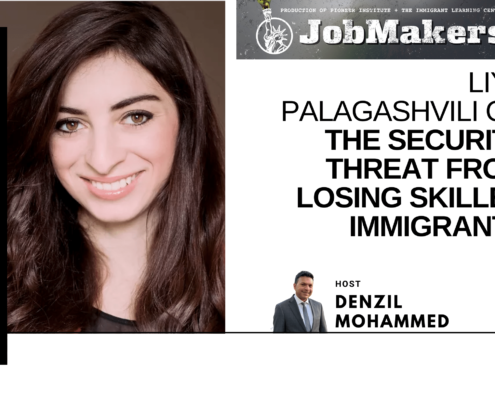
Liya Palagashvili on the Security Threat from Losing Skilled Immigrants
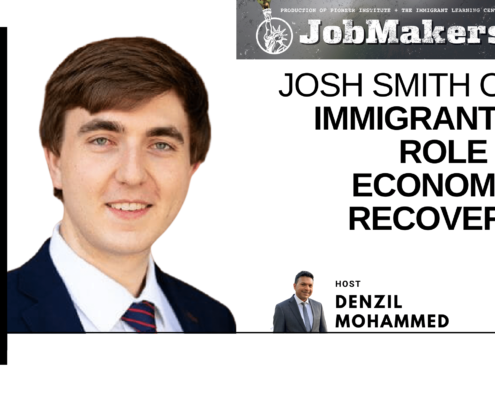
Josh Smith on Immigrants’ Role in Economic Recovery
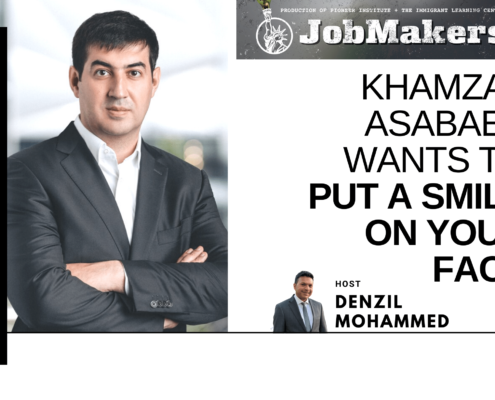
Khamzat Asabaev Wants to Put a Smile on Your Face
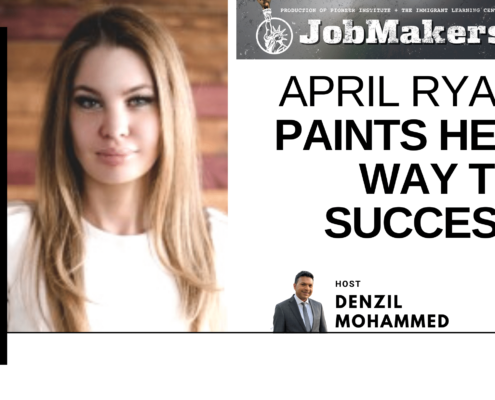
April Ryan Paints Her Way to Success
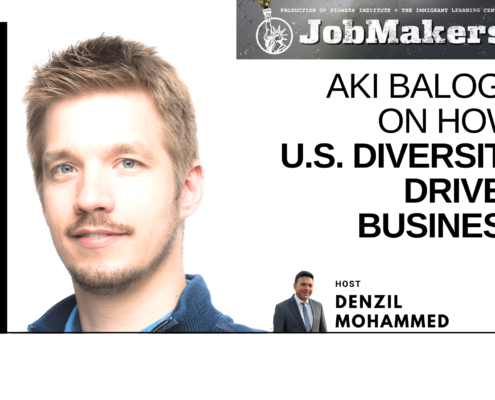
Aki Balogh on How U.S. Diversity Drives Business
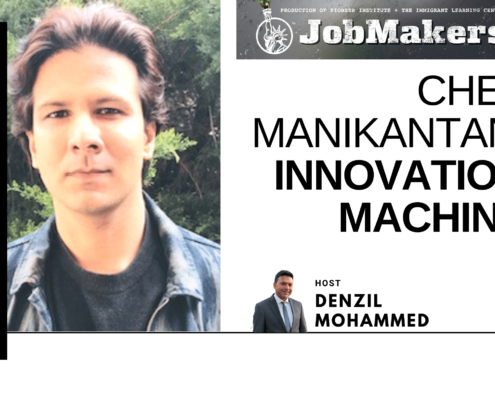
Chet Manikantan: Innovation Machine
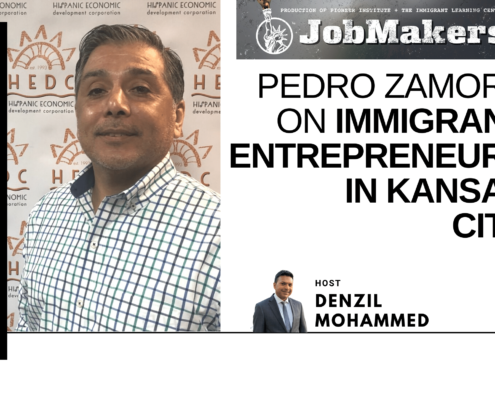
Pedro Zamora on Immigrant Entrepreneurs in Kansas City
